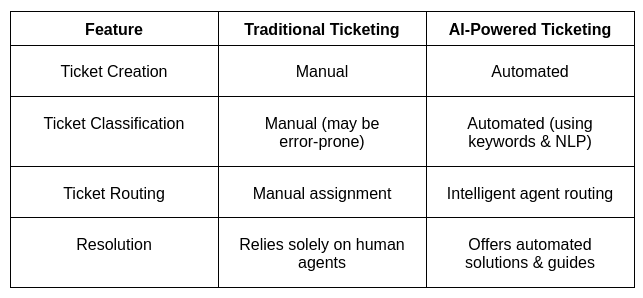Buckle up because we're about to dive even deeper into how this tech marvel is reshaping our approach to customer challenges.
In today's hyper-connected world, exceptional customer experience is no longer a nicety, it's a deal-breaker. Consistently, studies show that consumers prioritize customer experience highly. Over 80% of customers state that they consider their experience with a company as important as the products and services the company offers. However, traditional customer service models often fall short of these expectations.
Long wait times leave customers frustrated and drain their patience. Imagine waiting on hold for 20 minutes, only to be connected with an agent who isn't familiar with your specific issue. Inconsistent service quality further exacerbates the problem. Customers may receive excellent service from one agent, only to have a completely different experience with the next. Finally, the lack of personalization in traditional models can make customers feel like just another number. Without the ability to tailor support interactions to individual needs, it's difficult to build lasting customer relationships.
In this blog post, we explore how artificial intelligence (AI) transforms support through AI-powered ticket automation. By automating repetitive tasks and leveraging intelligent insights, businesses can use AI to deliver exceptional, efficient, personalized, and responsive customer experiences.
Companies that explore solutions like Omind's generative AI platform can revolutionize their approach to customer support, perfectly aligning with the need for more personalized and efficient customer experiences.
Understanding AI-Powered Ticket Automation

AI ticketing systems leverage artificial intelligence to automate various tasks within the customer support ticketing process. These systems can define and categorize incoming tickets based on keywords and past interactions, assign them to the appropriate agent with relevant expertise, and even automate solutions to frequently asked questions. By implementing AI in ticket resolution, companies can significantly improve efficiency and customer satisfaction.
The Evolution of Ticketing Systems
The shift from manual to automated ticketing systems has revolutionized customer support. Support agents using traditional methods had to manually create tickets, sort through them based on limited criteria, and assign them individually. This process was time-consuming and prone to errors. Advancements in AI technology have significantly changed this, allowing for the intelligent automation of these processes. Here's a comparison of traditional vs. AI-powered ticketing solutions:

Key Features of AI Ticket Automation Systems

AI ticketing systems boast a range of features that streamline support operations and empower agents:
Automated Ticket Generation, Classification, and Assignment: AI can automatically generate tickets upon receiving customer requests via various channels (email, chat, social media), categorize them based on issue type using Natural Language Processing (NLP), and assign them to the most qualified support agent based on expertise and workload.
Natural Language Processing (NLP) for Understanding User Queries: NLP allows AI systems to analyze the sentiment and intent behind customer inquiries. This enables them to provide accurate solutions from a knowledge base or chatbot responses, or route tickets appropriately for further assistance.
Integration with CRM and Other Existing Systems: Seamless integration with CRM systems and other internal tools like knowledge bases gives a comprehensive view of customer data, purchase histories, and past interactions. This empowers agents to provide more informed and personalized support interactions.
Omnichannel Support: AI ticketing systems offer omnichannel support, allowing customers to interact with support teams across various platforms (email, chat, social media) for a unified experience. This eliminates the need for customers to repeat information across different channels.
Benefits of AI Ticketing for Support Teams and Customers
Both support teams and customers reap significant benefits from AI-powered ticketing systems:
Increased Efficiency and Reduced Response Times: Automation frees up agents' time from repetitive tasks like ticket creation, classification, and routing. This allows them to focus on resolving complex issues faster and providing more personalized support. A study by Gartner found that AI-powered ticketing systems can reduce average ticket resolution times by 20%.
Improved Accuracy in Ticket Resolution and Routing: AI-powered classification ensures tickets are routed to the most relevant agent with the necessary expertise, leading to faster and more accurate resolutions. This reduces the back-and-forth communication often seen in traditional ticketing systems.
Enhanced Customer Satisfaction: Personalized and timely support through AI-powered chatbots or automated solutions for common issues improves customer satisfaction. Salesforce reports that 73% of customers say that AI-powered chatbots improve their customer service experience.
Reduction in Repetitive Tasks: Automation empowers support agents to focus on complex issues and provide higher-value interactions with customers, leading to increased job satisfaction and morale.
Challenges and Solutions in Implementing AI-Ticketing

While AI ticketing offers numerous advantages, there are challenges to consider:
Addressing Data Privacy and Security Concerns: When using AI ticketing systems, companies must implement robust protocols for data storage, access control, and encryption to ensure customer data privacy and security. Regular security audits and adherence to data privacy regulations are crucial.
Ensuring Seamless Integration with Existing Workflows and Technology: Careful planning and execution are required to integrate AI ticketing systems with existing workflows and technology, avoiding disruptions. This may involve training for agents on the new system and updating internal documentation.
Training for Support Teams to Adapt to AI-Powered Systems: Equipping support teams with the necessary training to adapt to and leverage AI-powered systems is crucial for successful implementation. Training should cover:
* Understanding the capabilities and limitations of AI ticketing systems.
* Effectively utilizing AI-generated insights and recommendations.
* Handling complex issues that require human intervention and judgment.
* Escalating tickets appropriately when AI solutions are not sufficient.
Future Trends and Developments
The future of AI ticketing is brimming with exciting possibilities:
Predictive Analytics for Preemptive Support and Ticketing: AI can analyze customer data, past interactions, and purchase history to predict potential issues and proactively offer solutions or suggest preventive measures before tickets are even created. This can significantly reduce the number of reactive tickets and improve customer satisfaction.
Machine Learning for Enhanced AI Ticketing Accuracy Over Time: Machine learning algorithms continuously learn and improve the accuracy of AI ticketing systems. As AI systems process more data and user interactions, they become adept at identifying patterns, classifying tickets more precisely, and suggesting even more relevant solutions. For instance, machine learning can identify emerging trends in customer inquiries and flag potential product issues before they become widespread.
Voice and Video Capabilities: The addition of voice and video functionalities to AI ticketing systems will create a more natural and interactive customer support experience. Voice assistants powered by AI can answer simple questions and complete routine tasks, while video chat allows for face-to-face interaction with support agents for complex issues. However, integrating these features requires careful consideration of user interface design to ensure a seamless experience. Additionally, robust natural language processing capabilities are essential to ensure accurate speech recognition and understanding of customer intent.
Expansion of AI Ticketing into Different Industries: AI ticketing solutions are not limited to customer service interactions. They can be applied in various industries and service areas, such as IT help desks, human resources departments, and even healthcare institutions. As AI technology continues to evolve, we can expect to see even wider adoption of AI ticketing systems across different sectors.
Conclusion
The impact of AI on ticket automation and customer support is undeniable. By embracing AI-powered ticketing solutions, companies can gain a significant competitive advantage by offering exceptional customer experiences that are efficient, personalized, and responsive. As AI technology continues to evolve, the future of customer support promises to be even more intelligent, proactive, and customer-centric.
| Name | Points |
|---|---|
| Dom | 6000 |
| Melissa | 5150 |
AUTHOR
Team Omind
Empowering Businesses with Unified Customer Experience Platform, Leveraging Advanced AI and Intelligent Automation
PRODUCT
Unified CXM
Share LINK
Related Blogs



